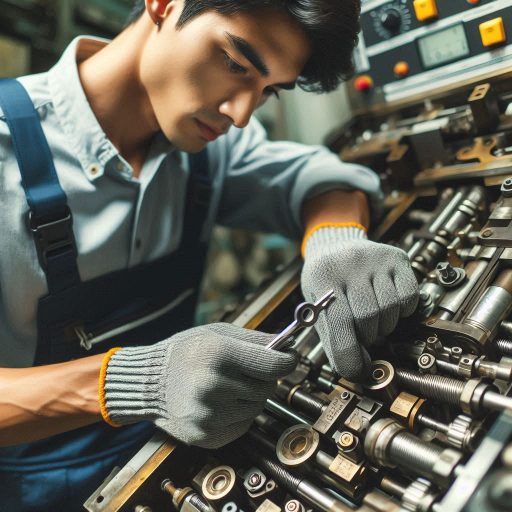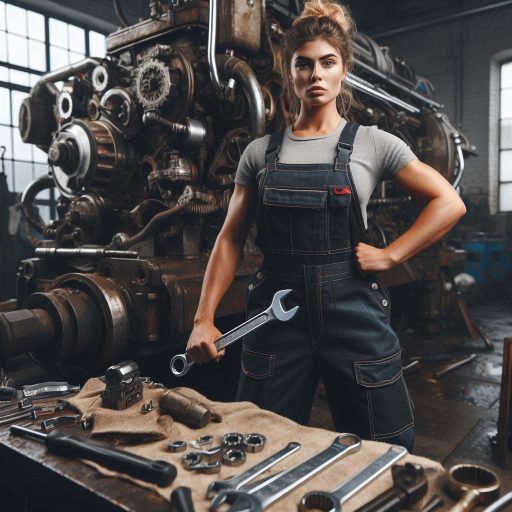Introduction
An industrial machinery mechanic is a skilled professional responsible for the upkeep and repair of complex machinery used in various industrial settings.
These mechanics play a critical role in ensuring that machines operate smoothly and efficiently.
They are involved in troubleshooting mechanical issues, performing routine maintenance, and executing emergency repairs.
Industrial machinery mechanics work with a diverse range of equipment, including conveyor systems, hydraulic presses, and electrical motors.
Mechanics must diagnose problems by examining machinery and using diagnostic tools.
They disassemble machines to identify defects or malfunctions and then replace or repair damaged parts.
Routine maintenance tasks include lubricating components, adjusting settings, and ensuring that all machinery meets safety and performance standards.
Their work is essential in preventing equipment failures that could lead to production delays or safety hazards.
Industrial machinery mechanics are indispensable across several industries, including manufacturing, automotive, and energy sectors.
In manufacturing, they ensure that production lines run efficiently, minimizing downtime and maximizing output.
Their expertise helps maintain continuous operation, which is crucial for meeting production targets and maintaining product quality.
In the automotive industry, mechanics play a key role in maintaining machinery used in vehicle assembly and repair.
Education and Training Requirements
Before embarking on a career as an industrial machinery mechanic, it is essential to meet the educational and training requirements in order to develop the necessary skills and knowledge needed for this field.
High School Diploma or Equivalent
One of the fundamental requirements to become an industrial machinery mechanic is to have a high school diploma or its equivalent.
This educational foundation provides the basic knowledge in math, science, and technical skills that are essential for this profession.
High school coursework in subjects such as mathematics, physics, and mechanical drawing can help prepare individuals for the more specialized training that will come later in their career path.
Technical Training or Apprenticeship Program
Once the educational foundation is in place, aspiring industrial machinery mechanics can further their skills by enrolling in a technical training program or apprenticeship.
These programs offer hands-on experience and specialized training in machinery repair and maintenance.
Technical training programs typically cover topics such as hydraulic systems, electrical systems, blueprint reading, and troubleshooting techniques.
Apprenticeships, on the other hand, provide on-the-job training under the guidance of experienced mechanics.
Both options are valuable pathways to gaining practical skills and knowledge in industrial machinery repair, which are essential for success in this career.
Certifications in Specific Machinery or Equipment
In addition to formal education and training, industrial machinery mechanics may also benefit from obtaining certifications in specific types of machinery or equipment.
These certifications demonstrate expertise and proficiency in working with certain types of machinery.
Organizations such as the International Fluid Power Society (IFPS) offer certifications in hydraulic systems, while the Electronics Technicians Association (ETA) provides certifications for individuals working with electronic control systems.
By obtaining these certifications, industrial machinery mechanics can enhance their credibility and marketability in the field, as well as stay current with the latest advancements in technology and equipment.
Meeting the education and training requirements outlined above is crucial for individuals aspiring to become successful industrial machinery mechanics.
By acquiring the necessary skills and knowledge through formal education, technical training, apprenticeships, and certifications, aspiring mechanics can lay a solid foundation for a fulfilling career in this field.
Read: Online Courses for Surveying and Mapping Technicians
Skills and Qualities Needed
Strong Mechanical Aptitude
A strong mechanical aptitude is crucial for becoming an industrial machinery mechanic.
This skill involves understanding how machines and mechanical systems work.
Mechanics need to comprehend blueprints and technical diagrams accurately.
They must also diagnose mechanical problems and devise effective solutions.
Mechanical aptitude allows technicians to quickly identify faulty components and determine appropriate repairs.
This skill is developed through hands-on experience and technical training.
Success in this career depends on the ability to grasp complex mechanical concepts and apply them effectively.
Problem-Solving Skills
Problem-solving skills are essential for industrial machinery mechanics.
Mechanics frequently encounter unexpected issues that require quick thinking and innovative solutions.
They must analyze mechanical failures and determine the root cause of problems.
Effective problem-solving involves troubleshooting, testing, and using diagnostic tools.
Mechanics often need to devise creative solutions when standard repairs are not sufficient.
Strong problem-solving skills help technicians minimize downtime and maintain efficient machinery operation.
Continuous learning and experience improve these skills over time.
Attention to Detail
Attention to detail is a critical trait for industrial machinery mechanics.
Precision in diagnosing issues and performing repairs is vital to avoid future problems.
Mechanics must ensure that every component is properly installed and functioning.
Small errors or oversights can lead to significant malfunctions or safety hazards.
Thorough inspections and meticulous work help prevent costly breakdowns and ensure machinery operates smoothly.
Attention to detail is developed through experience, training, and a commitment to quality work.
Physical Stamina
Physical stamina is an important requirement for industrial machinery mechanics.
The job often involves lifting heavy parts, working in awkward positions, and standing for long periods.
Mechanics need to handle physically demanding tasks without compromising safety or efficiency.
Physical stamina helps technicians endure the physical challenges of the job and perform repairs effectively.
Regular exercise and maintaining good physical health contribute to this stamina.
Being physically fit enhances overall job performance and reduces the risk of injury.
A career as an industrial machinery mechanic demands strong mechanical aptitude, problem-solving skills, attention to detail, and physical stamina.
Mechanical aptitude allows for understanding and repairing complex systems.
Problem-solving skills help tackle unexpected issues effectively.
Attention to detail ensures precision in every task.
Physical stamina enables technicians to handle demanding tasks efficiently.
Developing these skills through education and hands-on experience prepares individuals for a successful career in this field.
Read: Surveying and Mapping Technician: Job Satisfaction
Job Duties and Responsibilities
Inspecting Machinery for Defects
Inspecting machinery for defects is a crucial responsibility of an industrial machinery mechanic.
They conduct regular visual and operational inspections to identify potential issues.
Technicians check for signs of wear, corrosion, and misalignment.
They use diagnostic tools to assess machinery performance and detect abnormalities.
Thorough inspections help prevent unexpected breakdowns and ensure the equipment operates smoothly.
Mechanics must be detail-oriented, as small defects can lead to significant problems if not addressed.
Repairing or Replacing Parts
When defects are identified, mechanics must repair or replace faulty parts.
They disassemble machinery to access damaged components and determine the extent of the damage.
Skilled technicians use specialized tools to remove broken parts and install new ones.
They ensure that replacement parts meet manufacturer specifications and fit correctly.
Repairing or replacing parts requires technical expertise and precision.
Mechanics must also test the repaired machinery to confirm that it functions properly before returning it to service.
Performing Preventative Maintenance
Preventative maintenance is essential for extending the lifespan of industrial machinery.
Mechanics perform routine tasks to keep equipment in optimal condition.
This includes lubricating moving parts, adjusting settings, and cleaning components.
Preventative maintenance helps reduce the risk of unexpected failures and costly repairs.
Technicians follow maintenance schedules and manufacturer recommendations to ensure that machinery remains reliable.
Regular maintenance also enhances safety by reducing the likelihood of equipment malfunctions that could pose hazards.
Testing Equipment Functionality
Testing equipment functionality is a key step after inspections, repairs, and maintenance.
Mechanics run machines through various operational tests to ensure they perform as expected.
They monitor equipment for unusual noises, vibrations, or performance issues.
Testing verifies that all repairs and adjustments are effective and that the machinery operates within specified parameters.
This process helps confirm that the equipment is safe to use and ready for production.
Technicians document test results and address any issues that arise during testing.
Transform Your Career Today
Unlock a personalized career strategy that drives real results. Get tailored advice and a roadmap designed just for you.
Start NowRead: Field vs. Office Work in Surveying and Mapping

Industries and Settings
Manufacturing Plants
Industrial machinery mechanics are vital in manufacturing plants.
They maintain and repair complex machinery used in production lines.
Mechanics ensure that equipment operates efficiently and meets safety standards.
They perform routine inspections, troubleshoot issues, and replace worn parts.
Their work minimizes downtime and maximizes productivity.
Proficiency in mechanical systems and electrical controls is essential.
Technicians in manufacturing plants contribute significantly to smooth operations and high-quality production.
Construction Sites
On construction sites, industrial machinery mechanics play a crucial role.
They work with heavy equipment such as cranes, bulldozers, and excavators.
Mechanics ensure that these machines function correctly and safely under tough conditions.
They perform maintenance tasks and repair any breakdowns promptly.
Their expertise helps prevent delays in construction projects.
Knowledge of hydraulic systems, diesel engines, and mechanical repairs is critical.
Their work supports the efficient completion of construction projects and ensures site safety.
Power Plants
In power plants, industrial machinery mechanics are essential for maintaining energy production equipment.
They work on turbines, generators, and boilers.
Mechanics ensure that these critical components operate reliably and efficiently.
Regular maintenance and emergency repairs are part of their duties.
They must understand complex systems and perform diagnostic tests.
Their role is vital for continuous energy supply and plant safety.
Effective maintenance practices contribute to energy reliability and operational efficiency.
Automotive Industry
The automotive industry also relies on skilled industrial machinery mechanics.
They work on manufacturing equipment used to produce vehicles.
Mechanics maintain and repair machinery that assembles, tests, and inspects automobiles.
They ensure that equipment meets high standards for precision and safety.
Troubleshooting and repairing complex machinery are routine tasks.
Expertise in automotive systems and mechanical engineering is necessary.
Their work supports the production of high-quality vehicles and helps maintain industry standards.
Read: Safety Tips for Field Surveying Technicians
Career Growth Opportunities
When considering a career path as an Industrial Machinery Mechanic, it is essential to look at the growth opportunities available in this field.
By specializing in certain types of machinery, advancing to supervisor or management roles, and pursuing additional certifications or training, individuals can further their careers and reach new heights in the industry.
Specializing in certain types of machinery
One way to advance in the field of industrial machinery mechanics is to specialize in certain types of machinery.
By focusing on specific equipment, such as HVAC systems, manufacturing machinery, or construction equipment, mechanics can become experts in their chosen area.
This specialized knowledge can make them invaluable assets to employers and lead to increased job opportunities and higher pay.
Advancing to supervisor or management roles
Another career growth opportunity for industrial machinery mechanics is to advance to supervisor or management roles within an organization.
By demonstrating leadership skills, problem-solving abilities, and a strong understanding of machinery and equipment, mechanics can take on more responsibilities and oversee teams of other mechanics.
This can lead to higher salaries, increased job satisfaction, and a greater sense of accomplishment.
Pursuing additional certifications or training
Industrial machinery mechanics can also pursue additional certifications or training to enhance their skills and knowledge in the field.
By obtaining certifications from organizations such as the International Society of Automation (ISA) or the Mechanical Contractors Association of America (MCAA), mechanics can demonstrate their expertise and commitment to professional development.
Additionally, taking continuing education courses or completing on-the-job training programs can help mechanics stay current with the latest technologies and best practices in the industry.
Overall, the career growth opportunities for industrial machinery mechanics are diverse and abundant.
By specializing in certain types of machinery, advancing to supervisor or management roles, and pursuing additional certifications or training, individuals can expand their knowledge, skills, and job prospects in this exciting and dynamic field.
Read: Online Courses for Surveying and Mapping Technicians
Salary and Job Outlook
Becoming an industrial machinery mechanic offers a rewarding career with competitive wages and growth opportunities.
Understanding median annual wages, projected job growth, and salary influences helps in planning your career path.
Median Annual Wage for Industrial Machinery Mechanics
The median annual wage for industrial machinery mechanics varies by location and experience.
As of the latest data, the median wage stands around $56,000 per year.
This figure reflects the middle range of earnings for those working in this field.
Experienced mechanics or those in specialized industries can earn higher wages.
Projected Job Growth in the Field
Job growth for industrial machinery mechanics is positive and promising.
The Bureau of Labor Statistics projects a 7% job growth rate over the next decade.
This growth rate indicates a steady demand for skilled mechanics.
Industries such as manufacturing and production drive this demand, ensuring job stability and opportunities.
Transform Your LinkedIn into a Job Magnet
Picture recruiters reaching out to you daily. We craft personalized LinkedIn profiles that stand out, boosting your visibility in ways others can't. Elevate your career now.
Upgrade NowFactors Influencing Salary Levels
- Several factors influence salary levels for industrial machinery mechanics.
- Experience: Mechanics with more years of experience often earn higher wages. Expertise and a proven track record lead to better-paying positions.
- Location: Salaries vary based on geographic location. Urban areas or regions with high manufacturing activity typically offer higher wages.
- Industry: Mechanics working in specialized or high-demand industries may earn more. Industries such as aerospace or automotive can offer premium salaries.
- Certifications: Holding relevant certifications can boost earning potential. Certifications demonstrate advanced skills and knowledge, making technicians more competitive in the job market.
- Education: Advanced training or education can also impact salary levels. Mechanics with formal education or specialized training may qualify for higher-paying roles.
- Union Membership: Unionized positions often offer better wages and benefits. Union contracts can negotiate higher salaries and additional perks for their members.
- Company Size: Larger companies may offer higher salaries and more comprehensive benefits. Big firms often have more resources to invest in their employees.
Tips for Maximizing Salary Potential
To maximize your salary potential as an industrial machinery mechanic, focus on gaining experience and certifications.
Seek opportunities for specialized training and consider working in high-demand industries or locations.
Staying updated with the latest technologies and advancements in machinery can also enhance your earning potential.
A career as an industrial machinery mechanic offers a solid median annual wage and favorable job growth.
Factors such as experience, location, industry, and education influence salary levels.
By advancing your skills and choosing strategic career paths, you can enhance your earning potential and achieve long-term career success.
Work Environment and Schedule
Becoming an industrial machinery mechanic involves various physical demands and exposure to hazardous materials.
Understanding these aspects is crucial for anyone considering this career.
This section explores the physical challenges of the job, the risks associated with hazardous materials, and the realities of shift work and overtime.
Physical Demands of the Job
Industrial machinery mechanics face significant physical demands daily.
The job requires lifting heavy tools and equipment.
Mechanics often work in awkward positions, including crouching or kneeling.
They may need to crawl into tight spaces to perform repairs or maintenance.
The work can be physically exhausting, as it involves standing for long periods.
Mechanics frequently use hand tools and machinery that require precise manual dexterity.
Stamina and strength are essential to handle these tasks efficiently and safely.
Exposure to Hazardous Materials
Exposure to hazardous materials is a common aspect of being an industrial machinery mechanic.
Mechanics often work with chemicals, lubricants, and cleaning agents.
These substances can pose health risks if proper safety measures are not followed.
Protective gear, such as gloves and masks, is crucial to minimize exposure.
Mechanics must adhere to safety protocols to handle hazardous materials safely.
Understanding and implementing proper disposal methods for these materials are also essential parts of the job.
In addition to chemicals, mechanics may encounter sharp edges, hot surfaces, and moving parts.
These hazards require constant vigilance and adherence to safety standards to prevent accidents and injuries.
Shift Work and Overtime
Industrial machinery mechanics often work irregular hours.
Shift work is common, as machinery may need to be serviced outside regular business hours.
This can include nights, weekends, and holidays, depending on the industry and machinery requirements.
Overtime is frequently required to address urgent repairs or maintenance needs.
Mechanics might work extra hours to meet deadlines or to resolve issues that arise unexpectedly.
Flexibility and readiness to work additional hours are necessary traits for this career.
While shift work and overtime can lead to increased earnings, they can also affect work-life balance.
Mechanics must manage their schedules and personal time effectively to maintain overall well-being.
Conclusion
Industrial machinery mechanics are essential in maintaining and repairing complex machinery used in various industries.
They ensure equipment runs efficiently and safely.
Mechanics troubleshoot mechanical issues, replace worn parts, and perform routine maintenance.
Their work minimizes downtime and keeps production processes smooth.
They handle tasks ranging from routine inspections to major repairs on machinery such as conveyors, pumps, and motors.
The role of industrial machinery mechanics is crucial for operational efficiency.
Efficient machinery operation leads to increased productivity and reduced operational costs.
Their expertise prevents costly breakdowns and ensures safety compliance.
Mechanics’ skills directly impact the quality of products and services.
They help companies avoid costly interruptions and maintain competitive advantage in the market.
Pursuing a career as an industrial machinery mechanic offers diverse opportunities.
Mechanics can work in manufacturing, automotive, aerospace, and other sectors.
They can specialize in different types of machinery or become supervisors and trainers.
The demand for skilled mechanics is strong, offering job stability and career growth.
Technicians often receive ongoing training to keep up with technological advancements.
Individuals interested in becoming industrial machinery mechanics should explore this rewarding career path.
Start with a technical education or apprenticeship to gain hands-on experience.
Develop strong problem-solving skills and mechanical aptitude.




